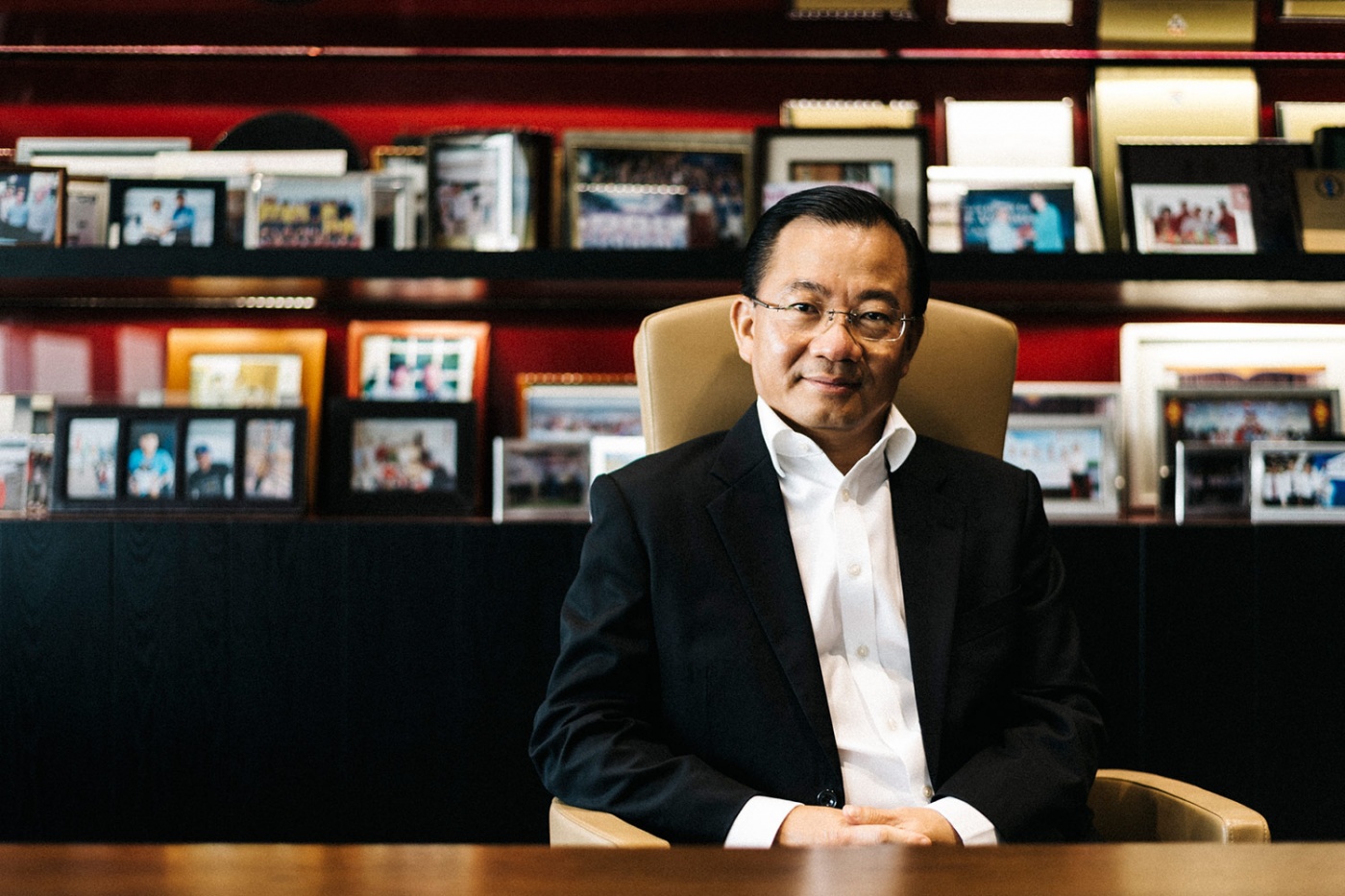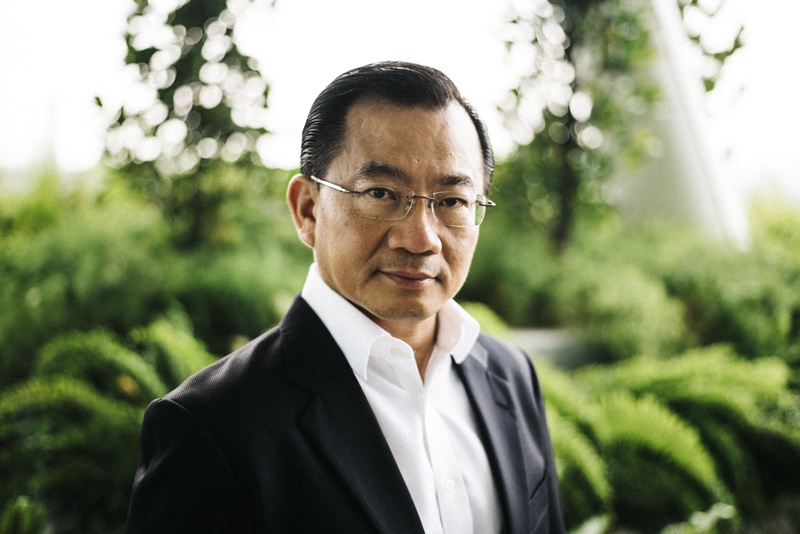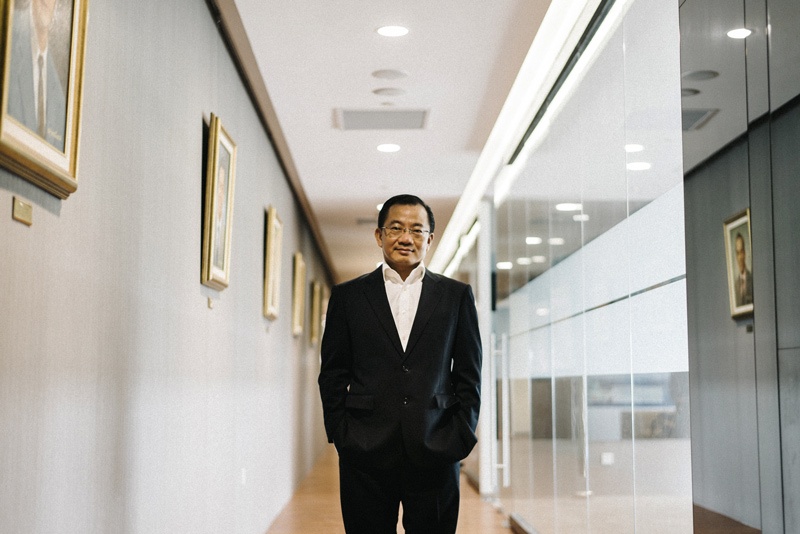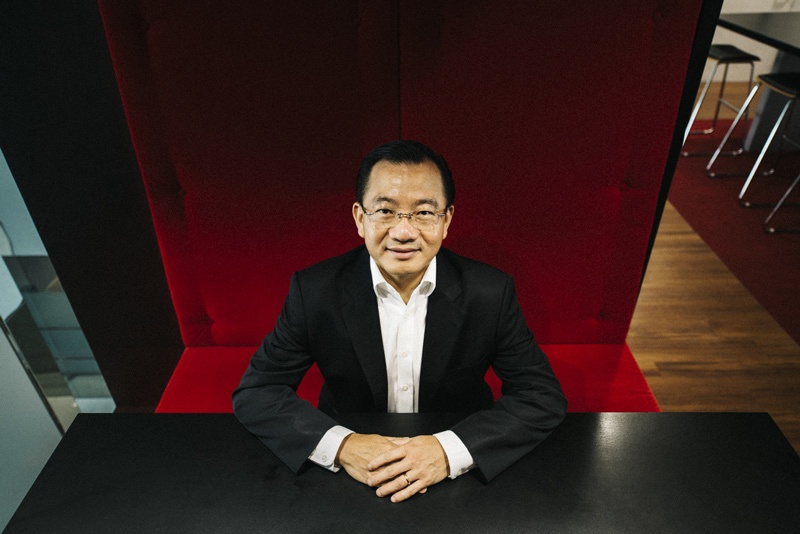NTUC FairPrice CEO Seah Kian Peng: ‘We intend to continue to be the local market leader’
As the CEO of the National Trade Union Cooperation (NTUC)’s supermarket and retail chain, FairPrice, Seah Kian Peng helms a brand that is just about the byword for “supermarket” among locals. Since its inception in 1973, the social enterprise has quickly and firmly become an integral part of Singapore’s national identity, stemming from its foundational mission to moderate the day-to-day cost of living for Singaporeans. FairPrice’s strong Corporate Social Responsibility (CSR) practice has also been firmly rooted in the social fabric of the nation, with longstanding efforts in quality and responsible retailing, environmental sustainability as well as community work and partnerships.
“We celebrate and embrace diversity in our team, whether it is in terms of background, expertise, experience, gender, age or ability,” Kian Peng says, in a committed tone after being with the organisation for 16-odd years. “But it is very important that the whole team, especially our leadership team, understand the values that FairPrice subscribes to. We conduct our business with purpose and everything we do must be in line with our social mission and CSR pillars.”
Under his strong leadership, the FairPrice cooperative is the local industry leader with close to 300 stores around the island, in 8 different retail formats including convenience stores, hypermarts and a warehouse outlet mall. Through constant transformation, competitive positioning and a strong, consistent brand, the nearly half-a-century old retailer is staying fresh, relevant and compelling to the notoriously fickle shoppers of today.
****
TEO REN FENG: As the leading supermarket brand in Singapore, FairPrice is the one to beat. What has been FairPrice’s edge over the competition thus far?
SEAH KIAN PENG: When I first joined, FairPrice was still a single-format retailer. Our market share was already quite big, but we’ve grown since then, and the only way to do that is to consistently remain relevant to consumers. That has meant evolving into a multi-format retailer. Most leading retailers tend to focus on a single format, like Carrefour and Walmart, but FairPrice has ventured into eight, which is not an easy task. Being a multi-format retailer allows us to penetrate the entire social strata in terms of age, gender, race and income.
REN FENG: What are the benefits of this multi-format approach?
KIAN PENG: Firstly, convenience. I wouldn’t be surprised if many of our customers shop at more than one format, and if you are talking about omni-channel retailing, I think this plays a part. My personal favourite outlets are close to home: FairPrice Finest at myVillage in Serangoon, or FairPrice Extra at NEX mall, and FairPrice at Serangoon Central. I occasionally pick something up from Cheers or FairPrice Express when I stop for petrol, or else order online. Second, we provide consumers with the experience because consumers also want interaction—grocery shopping is a social outing and physical sights, sounds, and smells still matter. Clearly, there’s been movement online and we’re putting a lot more effort into our e-commerce front, though I don’t think the online sphere will dominate the grocery shopping market. Amazon and Alibaba are also starting to get into brick-and-mortar, which shows they also realise that a purely online format—at least in its current model—is not sustainable. The answer will lie somewhere in the middle and FairPrice is in a good position to offer the entire suite since our footprint is very wide.
REN FENG: How is FairPrice coping with the increasing competition from new-age players like RedMart and Amazon?
KIAN PENG: There are no barriers to entry in this space that we’re in, so competition has always been intense and there’s nothing that we can do about it. Quite a number of global competitors have come into the local market over the last 20 years, and quite a few have also left. We’ve been able to rise to the occasion, compete, and at the end hold our ground and even improve our standing. But the intensity has reached a new level, since I don’t think there is anywhere else in the world where you have the 2 big boys like Amazon and Alibaba, fighting head-on. So yes, we are currently up against the best there is in the e-commerce space, and they are working with quite different business models—but it hasn’t quite settled yet, and no one has found a sustainable business model. Disruptions are taking place in all industries, and a new equilibrium has yet to be reached in many cases. It’s early days and we still don’t know how all this will end.
REN FENG: What must a business do to ride out such periods of challenge and uncertainty?
KIAN PENG: Knowing what your consumer wants, and understanding what’s out there in the market: what’s possible and if we are keeping up with industry developments. Besides embracing technology, there is a strong need to really understand your consumers’ lifestyles and demands. They want convenience, a good experience, and of course, an attractive value proposition. These are common and important to whatever business entity you are running, but all things being equal, another important factor influencing consumers’ shopping behaviour is knowledge of who you are and what your organisation stands for.
REN FENG: So are you pushing harder on that front?
KIAN PENG: I have to push hard on all fronts [laughs]. I can’t say that this is the most important because it won’t be; the consumer’s top priorities will always be convenience, experience and value. Every industry is being disrupted in terms of technology and workforce.
We’re scouring the world to see what’s out there, to stay one step ahead—in some cases, half a step is good enough.
REN FENG: How do you strike the right balance between being prudent yet open to adaptation and change for the future?
KIAN PENG: I think a business must be able to take a long-term view. People know that we are a tested, trusted and reliable brand—and we would not have been able to grow our market share if we had not been progressive and innovative. We’re scouring the world to see what’s out there, to stay one step ahead—in some cases, half a step is good enough [laughs]. Whether it is in embracing technology at the stores with self-checkouts and iCash machines, or at the back-end with our distribution centres, all these require long-term investments. Beyond that, our four CSR pillars also matter: Responsible Retailing, Sustainable Environment, Wonderful Workplace and Community Cares. Everyone, especially the younger generation cares about such initiatives, and they want to know how we do our business, how we treat our staff, and if we care about the environment and community.
REN FENG: How much weightage does FairPrice give to its social responsibility versus revenue?
KIAN PENG: Both are equally important. If our attention was skewed towards profit-making with a small portion allocated to ‘doing good’, I think our setup would not work. But it’s a balance that also depends on circumstance, so at different phases of our journey, it may slant one way or the other. In crisis, the do-good part of our business becomes the priority, but in challenging periods, it is the other way around. Ultimately, we work on the premise that both are equally important, because they reinforce each other. If you want to do your social mission well, you have to be strong, both financially and in the business, because that’s the only way that we can impact and moderate costs to achieve our social objective. To operationalise such a balance is not easy at all [laughs], but I want to repeat that it’s about calibration—it’s never a constant or a preset.
REN FENG: What particular challenges are unique to FairPrice as a business/social enterprise?
KIAN PENG: For most organisations, profits come above all else, but for us, profit-making is equal to our social responsibility, at best. It’s a challenge having multiple expectations to fulfil. Consumers want us to have better prices, but also wish for us to be more charitable and employ more… let me put it in this way, if we were not a social enterprise, if we were not NTUC FairPrice, but a completely different entity, would the make-up of our workforce change? I certainly think so. Would we have committed to measures to maintain a sustainable environment, like we have in place? Schemes to reduce food wastage and the use of plastic bags weren’t legislative requirements, but we did it because we actually believe in these social causes. We are the ‘people’s supermarket’ and we intend to continue to be the local market leader, in order to live up to our social purpose.
REN FENG: What 3 qualities do you hope the FairPrice brand will stand for, especially with the younger generations?
KIAN PENG: I would like FairPrice to be seen as a brand that consumers can trust. And I hope they see FairPrice as a brand that cares for the community, while being professional, well-run, and progressive. The brand stands for all these things, and there’s no one that drives harder than we do.
We always try to be the last to increase prices and the first to drop them.
REN FENG: What do you feel has gained consumers’ trust in FairPrice?
KIAN PENG: Trust as we know is earned—something that is built over time. In our 44 years of being around, FairPrice has demonstrated consistently how we have earned our shoppers’ trust. It is best demonstrated in the way that FairPrice preempted and responded to various crisis, some natural and some the result of government policies. Most recently, we were the first to withdraw APP-brand stocks from our shelves, when it was found that they were contributing to the haze problem. We always try to be the last to increase prices and the first to drop them, because we recognise that part of the role of being the market leader is to set the benchmarks. FairPrice absorbed the cost of GST (Goods and Services Tax) when it was first introduced even though we didn’t have to, in order to fulfil our social mission of moderating the cost of living. When people were worried that the prices of rice would escalate when the floods happened in Thailand, we reassured them and stockpiled, even though it came at a cost. During the SARS period, we maintained our prices on fresh vegetables when there was a scarcity, and imposed a quota on how much each of us could buy, so no one would profiteer.
REN FENG: FairPrice’s environmentally-friendly “Bring Your Own Bag” (BYOB) scheme operates on a rewards-based system. As the market leader, why not capitalise on your position to charge for the use of plastic bags, and influence greater change?
KIAN PENG: If we make consumers pay for plastic bags now, there will be cost implications that do not go with our objective of moderating the cost of living. In the UK and even in China, fines have been legislated, but not here. Locally, we remain the only supermarket that rewards a small token when you bring your own bag. It is a small amount, but when you gross it up, the scheme costs us about $500,000 per annum. It is a small token, but still a gentle nudge in the right direction, and I prefer an incentive-based, encouraging approach. All this is a work in progress, but it is a journey we are glad to be on and to be a frontrunner in Singapore.
REN FENG: I guess you don’t really believe in a punitive sort of leadership then?
KIAN PENG: My staff would have heard this before, but one doesn’t design policies that will inconvenience the 99%, just to catch a single wrongdoer.
REN FENG: What sort of leader are you?
KIAN PENG: It’s best I leave it to my staff—if you ask 10 of them, you will probably get 11 opinions about me. [laughs] I guess my style is a mix of formal and informal.
REN FENG: As a leader, what do you believe motivates employees?
KIAN PENG: I believe there are two things that matter. Most leaders say a lot of things, but what matters to most staff and also to myself, is what they do. Do you ‘walk your talk’? With our “One FairPrice Family” programme, our main office staff are strongly encouraged to spend at least 3 days or so working on the ground. Even our board chairman has volunteered to do it. The key purpose is for the headquarters staff to go through and know what is happening on the ground, and to be of help. It is also for the frontline to know that HQ is going out of its way to understand the challenges that they face, and see how they can help, especially during the peak periods like Chinese New Year, when every extra pair of hands counts. I think what else matters to an employee is if they feel their leaders—whether it is management, the CEO or their immediate superior—actually care about them. You could be a director, but it still matters to you if your boss treats you well, or if he genuinely cares for the team and the organisation. We have many staff who have been with us for a long time. They’ve built and grown with FairPrice together, and one word that frequently comes up when they are describing FairPrice, is family. We try to look out for one another, and care for each other’s well-being, so it’s not just about the digits. Just recently, I signed over 500 congratulatory cards—yearly bursaries we give out to children of our staff for school fees and needs. It’s just one of the ways, besides having a competitive pay rate, where we show our staff we care. Many of our activities, such as volunteering and the charity causes that we support promote the idea of family—so it’s not just a family within FairPrice, but as a social enterprise, within the community as well. Pay is important, but that alone is not going to keep staff. People like to know that they are part of an organisation that is making a difference to people’s lives in meaningful and impactful ways.
From the time that I started working here, I’ve never closed my door.
REN FENG: You’ve mentioned before that being a good leader means “having a listening ear”. What have you done to ensure that the lines of communication have remained clear in your organisation?
KIAN PENG: As a leader, you need to constantly stay in touch by making sure that you talk to various groups of staff. I have dialogues from time to time, most recently with a group of store managers. It’s not just myself but the rest of the team does it too. And I try to remind my staff that they are always welcome to come and talk to me. From the time that I started working here, I’ve never closed my door—I know it doesn’t mean that staff will automatically feel free to walk in, but I don’t want to impose an additional barrier between us. Also, if people feel strongly about something, I’m sure they will find a way to tell you. I get notes, emails, and messages on my social media, and staff sometimes talk to me over Facebook messenger.
REN FENG: What is the role of a good leader?
KIAN PENG: An organisation no matter how small or large, cannot depend on a single person. One must know that you don’t know everything, so make use of all your experts—within the organisation and beyond. Sometimes, tough calls have to be made with detractors along the way, but a leader needs to rally the crowd and bring everyone along the journey.
REN FENG: You believe that hard work always pays off. Do you think luck is a factor in success as well?
KIAN PENG: Opportunities come to everyone. Yes, luck plays a part, but sometimes when the opportunities are there but you don’t seize them, the next opportunity may or may not come at the right time. I think you cannot count on luck, but you can always count on hard work to get you somewhere. You also need the right mindset. We all tend to underestimate ourselves and what we can do, and that is what actually holds most of us back. If we can change our attitude, when opportunity knocks, you’ll be able to seize it without hesitation.
****
This interview is part of Influential Brands® Top CEO of the Year series, which recognises and profiles a select group of CEOs who are exemplary in 5 areas; Brand Leadership, Brand Expansion, Financial Performance, Innovation and Personal Integrity.
InfluentialBrands® recognises Brand Excellence & Leadership in Asia. Through our unique channels and methods, InfluentialBrands® aims to be a platform and champion of brand thought-leadership. The programme is tailored to enrich brands’ relationship with their consumers through meaningful conversations and engagement.
For more information, like and follow Influential Brands on Facebook for more updates.





